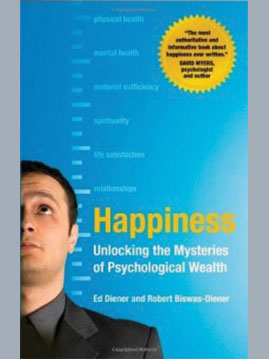Book Review: Happiness

Happiness: Unlocking the mysteries of psychological wealth By Ed Diener
There is a science to happiness, and Ed Diener and his son are the leading researchers on the topic. If you are interested in learning about happiness from a scientific perspective, this book is for you.
Mixed with useful information and research about what makes us happy, “Happiness” offers some insight into how to be truly happy.
“In this book we will describe the new concept of psychological wealth, which extends beyond material riches and beyond popular concepts like emotional intelligence and social capital. Psychological wealth is your true total net worth, and includes your attitudes toward life, social support, spiritual development, material resources, health, and activities in which you engage.”
 The book explains how happiness is the ultimate currency, and psychological wealth is our ultimate net worth. So, how do we attain happiness? Well, first, we need to understand that happiness is a process. There’s a common saying that “Life is a journey, not a destination.” Diener explains that happiness is the same. And, according to the book, happy people are more successful in every sense of their lives.
The book explains how happiness is the ultimate currency, and psychological wealth is our ultimate net worth. So, how do we attain happiness? Well, first, we need to understand that happiness is a process. There’s a common saying that “Life is a journey, not a destination.” Diener explains that happiness is the same. And, according to the book, happy people are more successful in every sense of their lives.
How do we increase our net worth?
- Give support more than you receive it. Do little things like holding the door open for people, or help your kids with homework.
- Understand “Affect Balance.” We don’t want (and can’t) be perfectly happy all the time. We need to experience sporadic anger, sadness, or worry. As such, “affect balance” is the sum total of our unpleasant moods subtracted from our pleasant emotions. “Using the affect balance approach to happiness, we need to make sure that we commonly experience good feelings, and only infrequently experience negative ones.”
- Be (and be with) Loving and Caring Angels. Happiness comes from sharing our lives with other people. Our social relationships are essential to our well-being.
- The Happiness Equation – Happiness = What we have (attainments)/What we want (aspirations). “It doesn’t matter so much if you make $20,000 a year or $100,000, if you drive a BMW or an old Chevrolet – what matters more is that your income is sufficient for your desires.”
- The Subtle Effects of Money. In a research lab, subtle hints of money made people feel more confident, but also made them feel more distant from others. “Materialists are generally less satisfied with their lives than folks who highly value love, friendships, and other worthwhile pursuits.”
- Making Happy Choices. “In order to make happy choices, listen to your heart, don’t worry about getting the very best all the time, and evaluate each outcome on it’s own merits rather than against others.”
- Take AIM at Happiness. Attention, Interpretation, and Memory. What you give your attention to will determine what you see. Focus on negatives, and you’ll live in a negative world. How we interpret a situation – good, bad, indifferent – affects our happiness. Use memories of past good times, while also appreciating the current moments.
So, if you’re looking for scientific explanations for finding happiness, and you’re ready to recognize the importance of psychological wealth, “Happiness” can make you rich!

